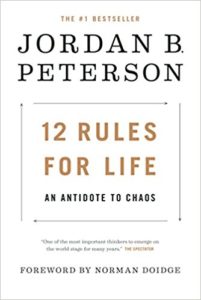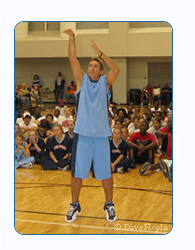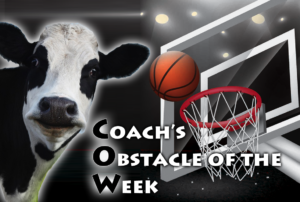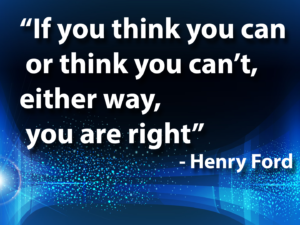 Jordan Peterson’s book, “12 Rules for Life, An Antidote for Chaos” has some good ideas but it is also heavy on Bible stories and quotes from philosophers and psychologists.
Jordan Peterson’s book, “12 Rules for Life, An Antidote for Chaos” has some good ideas but it is also heavy on Bible stories and quotes from philosophers and psychologists.
First question you probably have…
Are the 12 Rules worthwhile? Will they help you build a better life? Quick answer: Yes. They are worth reading but you might want to read through the summary below first to see if you are interested in reading more. Some of the chapters can get a little long winded (and go off on a few tangents) so you need to be motivated to stick with the book.
Let’s take a look at a brief summary of each rule…
Rule 1 – Stand up straight with your Rule shoulders back.
This is partly related to “Fake it until you make it.” It means that you should project confidence physically even if you might not be really “feeling it.” [Little secret that goes along with this… if you physically project confidence (or any other emotion really) you will start to move toward the actual feeling. Our emotions are tied to our physical “habits” so if you want to feel better (or more confident), move like you do when you feel that emotion… and the emotion will come.
Grade for Rule 1 … A+ (very worthwhile).
Rule 2 – Treat yourself like someone you are responsible for helping.
Most people treat their pets better than than they treat themselves. They take them for regular checkups while forgetting to do the same thing for themselves. If you are a parent there are an endless number of ways that you sacrifice for your kids. This rule says that you should at least apply the same standards to yourself and while it makes sense, it may be difficult to change your habits when it comes to self-maintenance.
Grade for Rule 2 … B+. This should be common sense but more people need to recognize that they can give more by taking care of themselves instead of sacrificing for others.
Rule 3 – Make Friends with people who want the best for you.
If you have studied nearly anything in the area of “personal development”, you have probably heard the saying that “You are the average of the 5 people who you spend the most time with.” If you hang out with millionaires, the odds are better that you become one too. If you hang out with people who eat poorly and never exercise, what do you think the odds are that you will be overweight? Jordan Peterson takes a little different angle on this concept. He suggests that finding people who will hold you to a higher standard will help you become your best self and realize more of your potential, Good idea. Not especially original but definitely something to apply to your life.
Grade for Rule 3 … A. This is a good idea, just not especially original. You have probably heard something similar already.
Rule 4 – Compare Yourself to who you were yesterday, not to who someone else is today.
This Rule especially applies to athletes but it can be applied to nearly any endeavor (academics, business). What you might think is “talent” may just be the result of someone working on a particular skill for longer than someone else. This article about “The Talent Myth” talks more about this concept.
The key point is that we need to be careful who we compare ourselves to. Everyone has their own journey and often someone else is a currently at a different point in their journey. Use them as an example or learn from them if you want to achieve whatever it is that they have achieved. Seems simple, right? Only if you keep this rule in mind and don’t make yourself feel bad because you “aren’t there yet”!
Grade for Rule 4… A. Important to remember. Learn from those ahead of you. Don’t feel bad because you aren’t there yet. Get to work!
Rule 5 – Don’t let your children do anything that makes you dislike them.
This rule applies mostly to parents but it could also be applied to managers within a company. Jordan Peterson includes many ideas for raising children as part of his 12 Rules and most of them are built around the idea of socializing kids so they can operate effectively in society. We live in a society and children need to learn what is expected. Making life easy for kids isn’t really doing them any favors in the long run. Another way of phrasing this rule… “Don’t raise a PIA.”
Grade for Rule 5 … B-. Good idea for parents but this rule doesn’t have as much application as the other rules.
Rule 6 – Set your house in perfect order before you criticize the world.
This is, by far, the best advice of the “12 Rules” book. Another way to say it is to “Tame your demons before tackling the world’s problems.” Jordan Peterson suggests that it is important to “Create Order in your life” where you can. [He talks a lot about “Order” and “Chaos” while drawing comparisons with Heaven and Hell.] The basic idea is that creating Order in your life (by taking control of what you can control) will give you the secure foundation you need to tackle the Chaos you will inevitably encounter.
Quick note… Chaos is not always bad. Creativity and Variety can come from Chaos. Order is not always good. Too much Order and you get boredom or limited growth. This may sound kind of Zen (Jordan explains the meaning of the Zen Circle and how it relates to Chaos/Order too.)
Grade for Rule 6 … A+ Best advice in the book. Do this first.
Rule 7 – Pursue what is meaningful (not what is expedient).
In other words… Shortcuts are not the answer. “Meaning” comes from “worthwhile challenges” and Jordan suggests that you should choose the challenges that will add meaning to your life. If you have been searching for the “Meaning of Life”, this might be as close to a good answer as you might find.
Grade for Rule 7 … A+. How can the “Meaning of Life” not get an A+? Is it easy to focus on doing something meaningful?…No. Is it worth it… you betcha.
Rule 8 – Tell the truth – or at least, don’t lie.
Truth is a tough subject. Jordan Peterson says Truth is order (and is also easier to remember than nearly any fiction you might conceive). Finding “Truth” also means confronting reality so tht you are not deceiving yourself (or others). The better we deal with reality, the better our results. Former CEO of GE, Jack Welch, has written a number of books and has said that the ability to discover reality and deal with it is one of the keys to the success he had when he ran General Electric.
Another way to state this rule would be to “Be a Pursuer and Purveyor of the Truth”. The only problem with the truth is that sometimes it isn’t “pleasant”. On the other hand, a little short term discomfort (like telling someone they need to improve something) is better than letting the problem grow. Rip that “Truth Bandaid” off quickly! [That’s my metaphor, not Jordan’s].
Grade for Rule 8 … A- While this rule seems simple, it can be tough to implement. If it was phrased along the lines of “Deal with Reality” (instead of the Truth angle) it might have wider application… but still worth applying!
Rule 9 – Assume the person you are listening to might know something you don’t.
This rule kind of shows how Jordan Peterson is Canadian. Canadians are known for being “nice” (compared to Americans) and this rule is something that will improve the connections you develop through your conversations with other people.
Another way to say it… Learn from others. They have done things you haven’t. If we focus on what we are going to say, we lose the chance to learn something.
Grade for Rule 9 … A. If you want to get better, you need new ideas. The best way to get new ideas is from other people. Listen. You have two ears and one mouth. 2-1, Listening to Speaking is a good start!
Rule 10 – Be precise in your speech.
This is one of the rules that isn’t exactly self evident by itself. One part of “precise speech” is the “Avoid blanket statements.” Another is to “Recognize Opinions vs Facts.” Jordan Peterson points out that precise communication requires work. It requires an understanding of the pitfalls of language as well as an open mind. How precise is your language?
Grade for Rule 10 … A. This is an area we could all improve and Jordan Peterson is someone who is very precise with his language. [Check out this interview where he talks about the Gender Wage Gap.]
Rule 11 – Do not bother children when they are skateboarding.
This is another rule that applies for parents (or adults who teach or manage children). Bottom line, according to Jordan Peterson, is that Children need challenges. This is how they explore the edges of their capabilities. They might get hurt. That’s part of the process… and part of the excitement.
Grade for Rule 11 … A. We all need challenges if we are going to grow. Not everyone will want to be a skateboarder but there are plenty of challenges out there… for adults as well as kids.
Rule 12 – Pet a cat when you encounter one on the street.
Another way of saying this (without the cat reference) is to “Engage with Opportunites to LIVE!” This is a good rule to end with because it is very easy to hide in our own little world and miss out on lots of the great parts of life, such as petting a cat (or dog). Don’t forget to connect with the outside world. There are lots of great things going on out there. When the opportunity comes around… ENGAGE!
Grade for Rule 12 … A+. Maybe this grade is higher than it needs to be… but I get to pat my dog every day and I highly recommend it for everyone!
Bottom Line – Is 12 Rules worth a read?
Jordan B. Peterson has clearly thought about life and “what works”. He has a strong grasp of the studies that explain the human condition. He offers wisdom that is generally accepted (and backed by research) within his field (psychology).
By reading the “12 Rules”, I learned a lot about the Bible and the psychology of success. There are plenty of interesting stories and examples … if you can wade through everything else. There are also many pop culture references (and ancient wisdom) that I navigated fairly successfully. On the other hand, some readers who did not grow up in the 60’s/70’s might not get the references. I am about the same age & educational level as Jordan Peterson so we start from a similar frame of reference.
If you found this review of the 12 Rules interesting, you may want to read the book. If you didn’t see anything that you want to dig into, you probably won’t like wading through all of Jordan Peterson’s stories and cultural references. Professor Peterson tends to go off on tangents so the book is not as easy to read as it could have been. I also found that there were times when it seemed like he was trying to prove how smart he is. As a university professor, this might be second nature but I could probably edit the whole book down to less than 2000 words. [BTW- this post is less than 2000 words.] Hopefully this post was helpful.
If you have already read the book, please leave a comment below to tell us what you thought about the 12 Rules!


 One of the biggest pet peeves I have as a coach is the
One of the biggest pet peeves I have as a coach is the  As I mentioned before, one great example is “I can’t”. Whenever you catch yourself saying, or thinking, the words “I can’t”, immediately STOP and take another look at the situation. When you say “I can’t” that implies that you
As I mentioned before, one great example is “I can’t”. Whenever you catch yourself saying, or thinking, the words “I can’t”, immediately STOP and take another look at the situation. When you say “I can’t” that implies that you